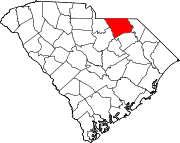Residents of McBee, S.C., have been without cable and Internet service since last November, when rural cable provider Pine Tree Cablevision closed its doors and turned the services off in scores of small communities in New Hampshire and South Carolina. For residents of Lamar, another South Carolina community served by Pine Tree, it wasn’t much of a service to lose. Pine Tree’s “broadband” in Lamar was limited to 50kbps, with the entire community’s Internet delivered on a single AT&T-provided T-1 line.
But even the loss of a company like Pine Tree was immediately felt by area residents and businesses, now without cable TV and Internet service. In Lamar, December 10, 2009 will remain a day of infamy:
“I was in the middle of submitting reports to SLED (the State Law Enforcement Division) when [Pine Tree pulled the plug and the cable and broadband system] went down,” Police Chief Charles Woodle told SC Now. Woodle now goes home twice a day to check his work e-mails.
The town’s water office closed December 21st because the town clerk could not upgrade the software needed to process water bills.
In Elloree, residents and local officials found out about Pine Tree’s financial problems when channels started dropping off the cable system, followed by the complete loss of service. In December, customers mailing payments to Pine Tree had them returned by the post office undelivered.

The now defunct Pine Tree Cablevision used to serve rural communities in New Hampshire and South Carolina.
Elloree Town Clerk Chasity Canaday told The Times and Democrat Pine Tree’s ultimate demise was a travesty.
“It shows a remarkable lack of professionalism to cut services from customers without any prior notice,” Canaday said. “For the majority of our residents, their notice that the cable service was terminated came when their televisions quit working.”
Despite claims from Pine Tree officials that new owners would take over the business they left behind, Canaday says that just isn’t true.
“It has been very, very difficult to get somebody else,” she said. “There is not a large enough customer base to entice a new company to come in. Most people have already switched to satellite.”
The newspaper noted after contacting 20 other municipalities, Canaday said most rural towns have no local cable provider and instead rely on satellite service.
Throughout rural South Carolina, tiny cable companies serving just a few hundred subscribers have come and many more have gone.
The town of Cameron lost Almega Cable about three years ago. Other communities have said goodbye to operators like Brookridge Cable, SRW Inc., South Carolina Cable Television, Pine State Management Co., and Mid Carolina Cable.
In most cases, satellite television’s ability to deliver hundreds of digital signals it an easy choice over cable systems delivering only 2-3 dozen channels. Because of a lack of investment to expand rural cable lineups, customer erosion has left many systems financially untenable. One Texas cable system had just a dozen paying customers left when they called it quits.
That’s why the community of McBee is creating a lot of buzz in rural South Carolina. They reportedly have Time Warner Cable, the nation’s second largest cable operator, in discussions to take over where Pine Tree left off, restoring cable and broadband service for a community of just 700 people.
But that service may come with a significant price — an indefinite franchise agreement that could eventually threaten the area’s local, customer-owned telephone cooperative.
Town Attorney Tony Floyd says Time Warner Cable in eager to expand into rural areas. But the question is, will McBee concede too much just to attract a cable company?
“This is a long term contract,” he told SC Now. “If you grant a franchise, Time Warner will be able to keep competition out.”
Newly re-elected councilman Shilon Green is the biggest proponent for the deal. He will propose an ordinance granting a franchise to the cable company at a town hall meeting to be held tomorrow. He says Time Warner will bring better cable and broadband service to the area and introduce competition for phone service with their “digital phone” product.
But some other council members are concerned about Time Warner Cable’s impact on the area’s local, customer-owned phone company, Sandhill Telephone Cooperative.
Councilmen A.C. “Kemp” McLeod said he’s afraid the cable company could bully the co-op out of business.
“I know Sandhill is expanding their service into the TV business, and they’ve been very good serving rural communities,” McLeod told the newspaper. “I’d like to check with them first.”
“If [Time Warner] wants to come in [and] lowball this area, they can do it, then run our small business out of business,” McLeod said. “A big company can make it look good, make it look appealing, then once they have the market and run the small guy out, then they can raise the rates. At Sandhill, we have representation.”
Rural communities are often bypassed by cable providers because they lack enough closely spaced customers to make the infrastructure costs worthwhile. Where smaller communities do cluster most of their population inside the town limits, cable systems have been built. Many are independently owned and operated by small providers because larger companies have shown no interest in serving areas with just a few hundred potential customers.
That has left town leaders with the prospect of offering generous incentives to attract cable operators. In addition to franchise agreements that never expire, some communities offer significant tax breaks and other concessions to encourage cable operators to bring service to area residents. Despite complaints from big city residents that Time Warner is hardly benevolent, its brand and reputation do mean a lot in rural areas burned by Pine Tree’s sudden demise last year.
Green hopes the cable giant will bring a level of cable service not seen before in towns like McBee.
“A little competition is good,” Green said.


 Subscribe
Subscribe



The return of the “company store”
Does SHTC have DSL in McBee? If they do then, though their prices are a bit high, residents should not be so quick to pull Time Warner Cable into town, unless TWC guarantees certain standards for their customers, like X number of HD channels X Mbps download and upload on internet service.